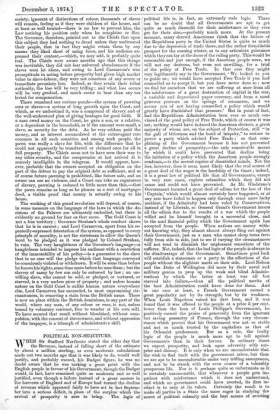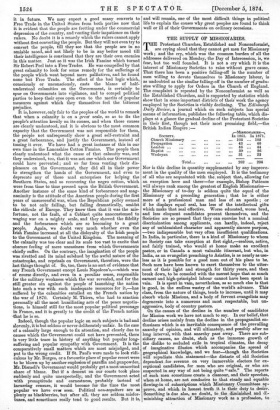POLITICAL NON-SEQUITURS.
W7N Sir Stafford Northeote stated the other day that the Revenue, instead of falling short of the estimate by about a million sterling, as even moderate calculations made out two months ago that it was likely to do, would well justify, and probably exceed, his Budget figure, he was no doubt aware that he was making a great point with the English people in favour of his Government, though the Budget would, in fact, have remained quite as moderate and as well justified, even though a failure instead of a great success in the harvests of England and of Europe had turned the decline of revenue which appeared fairly to have set in last Septem- ber into a serious deficit, in place of the surplus which the
revival of prosperity is sure to bring. The logic of political life is, in fact, an extremely rude logic. There can be no doubt that all Governments are apt to get quite as much discredit for their misfortunes as they ever get for their sins —probably much more. At the present moment, many shrewd Americans think that the failure of the Republican party in the United States is quite as much due to the depression of trade there, and the rather formidable prospect for the ensuing winter, as to any articulate grievance which they can lay at the doors of the ruling party. This would be reasonable and just enough, if the American people were, we will not say desirous, but even not unwilling, for a trial of the policy of Free Trade. In that case they might very legitimately say to the Government, 'We looked to you to guide us ; we would have accepted Free Trade if you had counselled us to accept it, but you have never done so ; now we find for ourselves that we are suffering at once from all the misfortunes of a great destruction of capital in the war, a variable and depreciated paper currency, and from a most grievous pressure on the springs of commerce, and we accuse you of not having counselled a policy which would greatly have diminished that pressure.' But in point of fact, had the Republican Administration been ever so much con- vinced of the good policy of Free Trade which of course it was not, nothing would have induced the American electors, a great majority of whom are, on the subject of Protection, still "in the gall of bitterness and the bond of iniquity," to restore to power a party which advised Free Trade ; so that com- plaining of the Government because it has not prevented a great decline of prosperity,—the only conceivable means by which it could have prevented that decline being the initiation of a policy which the American people strongly condemn,—is the merest caprice of dissatisfied minds. Not the less, however, does it seem most likely that the real source of a great deal of the anger is the hardship of the times ; indeed, it is a great law of political life that all Governments, except in very rare cases, expiate calamities which they did not cause and could not have prevented. As Mr. Gladstone's Government incurred a great deal of odium for the loss of the Captain,' which would almost certainly have happened, or at any rate have failed to happen only through some mere lucky accident, if the Admiralty had been ruled by Conservatives, instead of by Liberals, so General Grant's Government incurs all the odium due to the results of a war which the people willed and he himself brought to a successful close, and to the mad financial policy which the Government again has accepted from the people. When nations are uneasy with- out knowing why, they almost almost always fling out against their Government, just as a man who cannot sleep turns fret- fully from side to side, just to see if varying the circumstances will not tend to diminish the unpleasant sensations of the sufferer. Not, indeed, that the bad logic of the people is always to the disadvantage of the Government. Sometimes good luck will establish a statesman or a party in the affections of the people without the slightest merit on their aide. Lord Nelson and the Duke of Wellington did more by their naval and military genius to prop up the weak and blind Adminis- trations by which the latter at least was all but starved into failure,—than all the political merits of the best Administration could have done for them. And in one case at least, a French Government earned a great popularity not by its strength, but by its weakness. When Louis Napoleon raised his first loan, and it was found that it was offered to the people at a price 3 per cent. lower than the loan of Louis Philippe's Government, he positively earned the praise of generosity from the ignorant but saving peasantry of France, through the very circum- stance which proved that his Government was not so stable and not so much trusted by the capitalists as that of his Orleanist predecessor. But as a rule, the faulty logic of the people is much more apt to tell against Governments than in their favour. In ordinary times we expect prosperity, and look upon adversity with sur- prise and dismay. It is only when we are uncomfortable that the wish to find fault with the government arises, but then we are apt to be uncomfortable under very trifling annoyances, and not to be struck with the even course of a tolerably prosperous life. Nor is it perhaps quite so unfortunate as it is certainly unreasonable, that whenever a people gets im- patient with misfortunes which it does not understand, and which no government could have averted, its first in- stinct is to carp at its rulers. Certainly the result is to make all parties in a State the more eager in studying the secret of political calamity and the best means of averting it in future. We may expect a good many converts to Free Trade in the United States from both parties now that it is evident that the people are fretting under the commercial depression of the country, and venting their impatience on their rulers. No doubt it is a remedy which the rulers cannot apply without first converting the people. But they will not even try to convert the people, till they see that the people are in no amiable mood, and not likely to be in any better mood till their intelligence is convinced that they are their own enemies in this matter. Just so it was the Irish Famine which turned Sir Robert Peel into a Free Trader. He was compelled by that great calamity to look for some remedy for the sufferings of the people which went beyond mere palliatives, and he found none but Free Trade. The effect of the bad logic which, consciously or unconsciously, casts the blame of half- understood calamities on the Government, is certainly to spur on Governments into vigilance, and to compel political parties to keep their eyes open even to the merits of popular measures against which they themselves feel the bitterest prejudice.
It is, however, only fair to the peoples of the world to remark that when a calamity is on a great scale, so as to fix the people's attention keenly on its causes, and when those causes are clearly understood, and it is obvious to the most common capacity that the Government was not responsible for them, the people not unfrequently show a great self-restraint and a great forbearance, and justify the Government, instead of tossing it over. We have had a great instance of this in our own time in the Lancashire Cotton Famine. The people then clearly understood what the cause of that calamity was, and they understood, too, that it was not one which our Government could have prevented ; and so far from venting their dis- pleasure on the Government, they did all in their power to strengthen the hands of the Government, and even to deprecate any of those mad enterprises for helping the Southern States, and so recovering the negro cotton, which were from time to time pressed upon the British Government. Another instance of the same kind of forbearance and mag- nanimity is the attitude of the American people during the first years of unsuccessful war, when the Republican policy seemed to be not only failing, but failing dramatically, amidst the ridicule of Europe. They knew then that it was the mis- fortune, not the fault, of a Cabinet quite unaccustomed to -waging war on a mighty scale, and they showed the fidelity and the forbearance which are so becoming to a great people. Again, we doubt very much whether even the Irish Famine increased at all the disloyalty of the Irish people to the Government of the United Kingdom. The meaning of the calamity was too clear and its scale too vast to excite that -obscure feeling of mere uneasiness from which Governments -chiefly suffer. On the contrary, the imagination of the people was rivetted and its mind subdued by the awful nature of the catastropke, and reprisals on Government, therefore, were the last things thought of. So, too, there is no sort of evidence that any French Government except Louis Napoleon's,—which was - of course directly, and even in a peculiar sense, responsible for the military weakness which the war revealed, and for the still greater sin against the people of launching the nation into such a war with such inadequate resources for it,—has suffered by the calamities entailed on the French nation by the war of 1870. Certainly M. Thiers, who had to sanction personally all the most humiliating acts of the peace negotia- tions is himself still far the most popular political personage in France, and it is greatly to the credit of the French nation 4hat he is so.
Indeed, though the popular logic on such subjects is bad and slovenly, it is but seldom or never deliberately unfair. In the case of a calamity large enough to fix attention and clearly due to causes which the Government could not li:eve prevented, there is very little trace in history of anything but popular long- suffering and popular sympathy with Government. It is the comparatively small matters which are most misjudged, and put to the wrong credit. If St. Paul's were made to look ridi- culous by Mr. Burges, or a favourite place of popular resort were to be blown up by another explosion of paraffin and gunpowder, Mr. Disraeli's Government would probably gala most unmerited share of blame. But if a descent on our coasts took place suddenly and quite unexpectedly, and the Government acted with promptitude and earnestness, probably instead of incurring censure, it would become for the time the most popular we have ever seen. Political non-sequiturs are as plenty as blackberries, but after all, they are seldom misfor- tunes, and sometimes really tend to good results. But it is, and will remain, one of the most difficult things in political life to explain the causes why great peoples are found to think well or ill of their Governments on ordinary occasions.



































 Previous page
Previous page